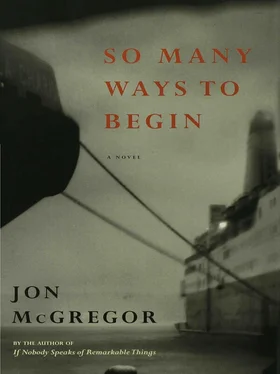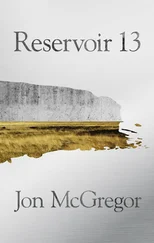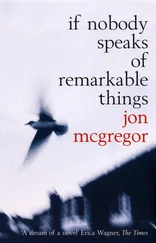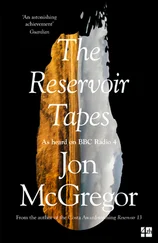So tell me, her mother went on, since you're the bright spark of the family now, where were you planning on finding formal evening wear, and bedlinen, and all those books? How were you thinking we were going to pay for it all? Because I don't think a year's worth of serving teas has quite covered it, has it now? She leant towards Eleanor, lowering her voice. Or had you not given it any thought, eh? she said.
The food was ready on the table. A large brown casserole dish on a mat in front of Stewart, steam piping out of the small hole in the lid. Butter melting over the hot salted potatoes in their bowl. Half a loaf of bread ready to be cut on the board, and no one touching a thing. Eleanor looked back at her mother, and perhaps allowed herself a smile as she saw a way around all these objections. Or perhaps she didn't dare smile. Perhaps she sat lower in her chair, dropping her gaze from the cold stillness of her mother's eyes.
There's a grant will pay for that, she said, quietly, or proudly, or defiantly. They give you a grant for all your expenses.
I thought that would be enough David, she said, her voice stumbling and rushing down the phone line towards him. I thought she'd maybe smile or say that's okay then at least, she said.
But instead there was her mother's hand cracking down on to the table, a flinch from both Eleanor and her father, her mother's voice cutting sharply into the room, saying this family has never taken charity and it's not about to start off now.
It's not charity, replied Eleanor, and David imagined that there were already tears in her eyes as she realised how soon the conversation would be over. It's a grant, she said. Everyone gets one, she said.
She'd worked a year for this, saving her wages from the tea room and working spare shifts at the social club so that her mother wouldn't have this excuse, couldn't say these things, and it seemed impossible that it would all come to nothing now, that the plans she'd made so carefully were not going to work out. She'd studied the prospectus so many times it was falling apart; she had a room booked in the halls of residence, and a suitcase ready to pack, and textbooks already bought. She'd been waiting a year for this, she'd been waiting her whole life for this.
It's a grant, she said again, hopelessly. Everyone gets one.
A couple of times before, waiting together at the station for his train, he'd said why don't you come with me, only half as a joke, and both times she'd been cross and said he wasn't to say that, it wasn't funny, it wasn't fair. But that August evening, with Eleanor waiting on the end of a 400-mile phone line, with the sunlight pouring through the frosted glass, with all the bearings he'd always taken for granted so recently pulled away, he saw with absolute clarity that it could be as easy as saying the words. That things can sometimes happen just because you ask them to.
What am I going to do? she asked him again.
He walked from the train station to her house in a slight daze, uncertain of what was going to happen, or whether he was even doing the right thing. The harbour quays seemed quieter than usual, the road less busy. A trawler headed towards the mouth, the low sputter of its engine floating back across the water. From somewhere on the north side came the sound of hammer on sheet steel, ringing through the afternoon. The still dry air was salted with the smell of fish and diesel and rusting iron. He got to the bridge, and crossed over the Dee into Torry, stopping a moment to wipe the sweat from his face, his hands, the back of his neck.
He walked up the hill, quickening his pace as he got closer, anxious to get it over with. There were very few people around, and his footsteps sounded out loudly along the narrow street. The front-room window of her house was open when he got there, and as he knocked on the door he heard her voice through the net curtain saying that'll be David then, and her father muttering something in brief reply.
He didn't go inside. He waited by the door, listening to their low voices, listening to her footsteps clattering quickly up and down the stairs, and then she wras there, ready, with him. Stewart met his eyes just once, as the three of them stood there shuffling their feet.
David, he said, nodding.
Afternoon Mr Campbell, he replied, as though they were bumping into one another in the street, as though it wouldn't be long before they saw each other again. He picked up Eleanor's suitcase. He said, well. He turned away, while Eleanor said goodbye to her father, and then he walked with her back down the hill.
22 Book of Co-op dividend stamps, 1968
Stewart took a white handkerchief from his pocket and wiped at the sweat on his forehead, to keep it from trickling into his eyes. He stood, with one hand on the door frame, one foot on the front step, watching the pair of them until they'd rounded the corner at the bottom of the hill, waiting to see if one or other of them might turn around, just once. Or he went back inside as soon as they'd said their goodbyes, closing the door sharply behind him, breathless with rage and regret. Or he waited a moment, went inside to put the kettle on, and came back out to see whether they might not, after all, still be there.
Later, with a cup of tea poured out but not yet drunk, sitting in his armchair by the window, he heard the front door open and Ivy come in, talking to Donald. They stood in the doorway, Donald holding two baskets of shopping from the Co-operative, Ivy out of breath from the long walk up the hill. She smiled. Enough in the pot for us, is there? she asked.
Aye, but it'll be stewed by now, he replied quietly. He nodded hello to Donald. Ivy looked at him and stepped into the room.
What's got you? she asked.
You're home early, Stewart said.
The job was done, so they let us go before time, she said. She studied his face. What are you not telling me? What's got you? she asked again. Stewart said nothing, looking away into the empty fireplace. Has something happened? she said. There been an accident?
No, he said. No accident.
What then? she insisted. Eh?
Stewart took a deep breath, and waited. Donald turned away, saying something about putting the shopping down in the kitchen and making a fresh pot.
Our Eleanor's away to the train station, Stewart said, pinching at the loose skin on the back of his knuckles.
Where's she going? asked Ivy sharply. Was she with that English boy?
Aye, he said. The two of them are away to the train station with a suitcase of Eleanor's things. She'll not be back for a time, he added.
Aye right, you're no mistaken there, are you? Ivy snapped sarcastically. She's no just away to the beach?
Stewart didn't reply.
Did you not try and stop them Stewart? Did you not try and keep them at least while I got back? Or did you just wave them off goodbye, eh? She came towards him as she said all this, her voice rising and breaking, and he looked away from her and he didn't say a word.
Aye and what happens now Stewart? Where are they going to? How are they going to get by? What did she say Stewart, what did she say? And by now she was shouting, until her voice collapsed and she sat suddenly down on the small sofa across from the fire.
In the kitchen, Donald was standing by the window, his hands gripping the edge of the stone sink, his head bowed, listening.
Ivy looked at her husband. She said, is she in trouble?
Stewart pulled at the skin on the back of his hand again. He twisted his finger until it clicked, painfully, in its joint. I don't know, he said.
Oh, aye, she said, her voice hardening again, I'll warrant she is. I never trusted that pair. She stood up again, peering out of the window, checking that no neighbours had seen or heard what she'd said. Stewart looked up at her, running his hands along the seams of his trousers, not knowing what more to say. In the kitchen, Donald poured out the tea and wiped his face with the sleeve of his shirt.
Читать дальше
Конец ознакомительного отрывка
Купить книгу











